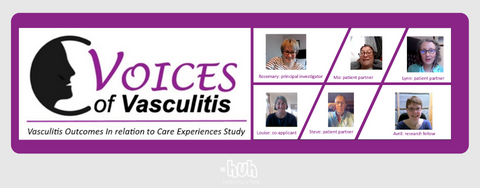Dr Rosemary Hollick, a Rheumatologist in NHS Grampian and a Senior Clinical lecturer at the University of Aberdeen, has been in touch to tell us about the VOICES study.
Why was VOICES set up?
VOICES was designed to help us decide how best to organise and deliver care for patients with systemic vasculitis. Vasculitis is a group of rare diseases that cause inflammation of the blood vessels. Any blood vessel in any part of the body can be affected. There are different types of vasculitis. In the VOICES study we are looking at primary systemic vasculitis. ‘Primary’ means the vasculitis isn’t a result of another illness, and ‘systemic’ means it can involve any part of the body.
The problems that result can range from mild to very severe and life-threatening. Even people with the same type can be affected in very different ways, and to different degrees, meaning that individual care needs are very different. Early diagnosis and access to specialist care are critical to achieving positive outcomes. However, people with systemic vasculitis and other rare diseases struggle to navigate the healthcare system because it is not designed to manage complex diseases. Across the UK there are significant differences in how these conditions are looked after.
VOICES is funded by Versus Arthritis and aims to:
- Identify and understand variation in vasculitis care across the UK
- Identify key elements underpinning effective care from the perspective of people living with vasculitis and those treating people with vasculitis and
- Apply this knowledge to help us better design services and ensure equitable access to effective, coordinated care and support for people with systemic vasculitis.
Involving patients in this project, both as participants in the research and as part of the research team, was paramount. Rosemary said: ‘Patient, Public Involvement and engagement (PPIE) was embedded within the study from the start. However, this has developed and changed over time as our relationships have evolved and it has led to new opportunities and different ways of thinking.
The study is ongoing, but we have already co-produced several outputs with our patient partners that are grounded in patient experience:
- A web resource on healthtalk.org. This features 32 people from across the UK talking about what it's like to live with systemic vasculitis.
- A 'catalyst film' to help staff and patients think about how they could improve care locally.
We also gave a presentation at the Health Services Research UK Conference 2022 about our PPIE experiences. You can see the full recorded presentation here (17 minutes long). This includes an interesting conversation between researchers, clinicians, and patient collaborators about working together, building trusting relationships and the ethic of responsibility we have to each other, to other patients, colleagues, and to the quality of the research. We won an Innovation in Inclusion in Health Services Research award, supported by the Health Services Research National Specialty Group in the NIHR Clinical Research Network. You can read more about this in an accompanying blog - Frankly speaking - conversations about PPI – where Louise Locock reflects on our experiences.’
